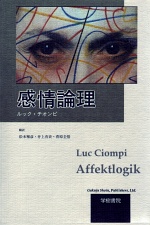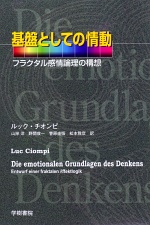
The concept of affect-logic
The concept of affect-logic is a basic metatheory of the laws of interaction between feeling and thinking. It integrates findings on the relations between emotion, cognition and behavior from psychology, psychiatry, psychonalysis, sociology, neurobiology and evolutionary sciences, by formulating a series of basic principles that have often been neglected so far. Its aim is to combine scattered knowledge about emotion and cognition from different fields of science into a meaningful general concept of practical as well as theoretical relevance.
The basic theoretical framework is system-theoretic, including modern notions on non-linear dynamics of complex open systems (dynamical systems theory, or so-called chaos theory).
The concept of affect-logic has first been presented in the German book "Affektlogik" (1982) by Luc Ciompi (English translation: The psyche and schizophrenia. The bond between affect and logic. Harvard Univ. Press 1986) and continually updated since, under the impact of new research findings. It leads to practical applications in all areas where interactions between feeling and thinking are important, from psychology, psychiatry, psychotherapy and pedagogy through business, advertising and politics to epistemology and philosophy.
The eight main postulates of affect-logic are, in summary:
- Emotion and cognition are interacting in all mental activities
- Filtering and switching effects of emotions on cognition are constantly modulating our thought and behavior
- Simultaneously experienced emotions, cognitions and behaviors are associated and stored in memory as comprehensive "programs" for feeling, thinking and behaving. Such "FTB-programs" regulate and modulate future feeling, thought and behavior in simiar situations
- Experience-based FTB- programs of various dimensions are the basic "building blocks" of the psyche. They correspond to typical systems in the systemtheoretical sense, whose equilibrium is constantly stabilized or destabilzed by negative or positive feedbacks from the environment
- The total of experience-based FDV programs provides individual-specific, family-specific, group-specific and cultural-specific patterns of feeling, thinking and behaving (or "mentalities", worldviews, affective-cognitive self-worlds)
- Emotions are vital psychosomatic states with directed bioenergetic components, rooted in evolution. Emotional energies are the decisive motors of all thinking and behavior. Cognitions provide the structure, and emotions provide the dynamics of FTB- systems of any dimension
- Critically increasing emotional tensions can lead to sudden global changes (non-linear bifurcations) of the prevailing patterns of feeling, thinking and behaving
- Affective-cognitive interactions are self-similar ("fractally structured") on all individual and collective levels
Definitions
So far, interdisciplinarily accepted definitions of emotion or overlapping terms such as feelings, affects or moods are lacking. There meaning varies considerably from one author, field of science or linguistic area to another. The notions of cognition and logic, too, are often not clearly definded. On the basis of their common denominators, the terms of affect, cognition and logic are broadly but sharply defined and delimitated from each other, in affect-logic, as follows:
The notion of affect (which for certain authors includes all kinds of emotion-like phenomena, while others restrict it to a particular type of subjective experience) is used as a broad "umbrella-notion" which covers all kinds of emotion-like phenomena variably called emotions, feelings, affects or moods. An affect in this sense is a situation-specific psycho-somatic state of variable duration, intensity, quality and degree of consciousness. It is characterized by specific expressive, subjective, physical and neuro-biologic features, and by a situation-specific pattern of energy consumption.
Basic affects like interest, fear, rage, joy or sadness are rooted in behaviours relevant for survival and selected by evolution, such as exploration of the environment, avoidance of danger, defence against enemies, food-intake, socialisation, collaboration and bonding, sexuality, readjustment after significant losses. Their basic patterns are mostly innate, but culturally modulated. Pleasant relaxation, calmness or indifference, too, are affective states in the defined sense, with important effects on thought and behavior. Hence, one is always in a certain affective state, and affective-cognitive interactions are omnipresent.
The notion of cognition, too, is used in a broad sense including different specific functions such as perception, attention, memory and combinatory thought. Cognition is defined, in close relation with general cybernetics and information theory (especially with the notion of a "bit" = the smallest perceived difference), as the capacity of distinguishing and further elaborating sensory differences, and differences of differences (e.g. the capacity of distinguishing between black and white, warm and cold, harmless and dangerous, or various nuances of them). Cognition in this sense, too, is a basic property of living organisms which appears very early in evolution.
The notion of logic in a broad sense, used in affect-logic, includes not only the formal (Aristotelian) logic, but also the so-called everyday logic and different types of affect-dependent logic (see below). It is defined as the way how cognitive elements are connected and combined in comprehensive thought and decision making, (e.g. in order to form, a specific theory, "world view", "mentality" , or ideology).
Integrated feeling-thinking-behaving programs - the essential "building stones" of the psyche
Simultaneously experienced emotions, cognitions and behaviours are functionally linked and conjointly memorised. Links between specific emotions, cognitions and behaviours are reinforced by repetition. They store past experience which is reactivated in similar situations and function, hence, as comprehensive "programs" for future emotional, cognitive and motor behaviour (abbreviated: ECB-programs). Also in humans, a few ECB-programs are innate (e.g. certain fear-reactions), but most of them are acquired by experience. Integrated ECB- programs of variable degrees of complexity are the essential "building stones" of the psyche.
Filtering and switching effects of emotions
Emotion and cognition are continually interacting in all mental activities: Specific cognitions trigger specific emotions, and specific emotions modulate and change the related cognitive functions.
Affect-logic focuses particularly on the - so far largely neglected - filtering and switching effects that basic affects such as fear, rage, joy or sadness continually exert on cognition. The prevailing affective state actually influences the energy, speed, form and content of thought and perception. It also modifies the focus and the hierarchy of attention, the mobilisation and storage of selected cognitions ("state-dependent selective memory"), and the way how affect-selected cognitions are combined in comprehensive thought - that is in common "logic" in the above defined broad sense.
Cognitive elements with similar emotional connotations (e.g. all pleasant or unpleasant aspects of a person, of a town or of a country) are preferentially connected, while dissimilar elements are preferentially disconnected ("repressed"). In other words: specific affects have an attractor-like (or glue-like) effect on cognitions with a similar emotional connotation.
The evolutionary function of the affects and of their selective effects on cognition is the situation-appropriated reduction of the complexity of the surrounding cognitive world, in the service of survival.
Different affect-dependent logics and everyday-logic
Comprehensive thought and logic in the above defined broad sense are strongly dependent on the prevailing affective state. Different types of "logic" prevail, therefore, in different affective states: There exists, e.g., a specific "logic of fear", a "logic of hate", a "logic of love", or, on the collective level, a "logic of war" or a "logic of peace".
Even the apparently unemotional everyday logic is conditioned by underlying effects of formerly intense affects. Everyday logic is based on past experiences - e.g. an exciting first encounter, a scientific or artistic discovery, etc - which were initially related to strong conscious feelings that are, however, progressively dampened and automatized through repetition and habituation. Nevertheless, the initial affects continue to exert their filtering and switching effects on everyday thought and behaviour: They condition not only all "semi-automatic" skills like car-driving, talking, music playing etc, but also our habitual ways of thinking. All our apparently "self-evident" personality-specific, group-specific and culture-specific value systems, political or religious ideologies and prejudices were initially shaped by strong emotions such as fear, rage, pleasure or disgust etc. When habitual "self-evidences" are suddenly violated, their underlying emotional components reappear immediately.
The role of affects in rational thought and logic
Contrary to common beliefs, rational thought and formal logic, too, are modulated by underlying affects: Logical conflicts, contradictions and paradoxes are unpleasant and therefore, emotion-energetically spoken, uneconomic. On the other hand, contradiction-free solutions are pleasant, relaxing and economic ("easy going"). Seeking pleasure and avoiding displeasent tensions plays a significant - albeit generally overlooked - role in the construction and stabilisation of formal logic and rational thought. Here, too, initially strong emotions are gradually dampened when the new ways of thinking become routine. They continue, however, to covertly influence rational thought and logic through the selective effects of positive feelings: Pleasant solutions are systematically favoured and unpleasant solutions are avoided. Moreover, positively "coloured" cognitive elements of scientific thought are built together, while contradictory elements are, if possible, neglected, in order to form a comprehensive scientific theory, in exactly the same way as cognitive elements with a similar emotional colour are preferentially connected, while contradictory elements are repressed, in everyday thought and logic.
The energizing effects of emotions
The filtering and switching effects of emotions on cognition are related to yet another important aspect of emotions which, too, continues to be generally neglected, namely their energetic dimension. Different emotions are characterized by different patterns of goal-directed energy consumption with mostly stimulating and mobilizing, but sometimes (as e.g. in freezing or depression) also inhibiting effects on thought and behaviour. Charging a mental or social system with specific emotions corresponds to an input of energy. Emotional energies stirred up, e.g., by economic, political, psychological, social or religious conflicts, are the very "motor" behind all mental or social dynamics.
Contrary to the usually only qualitative definitions, the energetic understanding of emotions has the advantage of being, in principle, quantifiable. It explains the powerful energizing effects of emotions on individual and collective thought and behaviour both in everyday life and in exceptional situations like mass-panic, enthusiasm, rage, horror, mourning, etc. It also leads to a deeper understanding of sudden global modifications (so-called bifurcations) in the habitual ways of thinking and behaving both of individuals or groups, up to whole nations: On all levels, such bifurcations occur inevitably, when increasing emotional tensions in a mental or social system reach a critical level which cannot longer be processed by the habitual modes (or "channels") of thought and behaviour. The consequence is a sudden shift of the general pattern of functioning into a new global "regime" - e.g. from a "logic of peace" to a "logic of war", from a "logic of love" to a "logic of hate", or (as the research on so called EE ="High expressed emotions" has showed) from a normal to a psychotic logic and behaviour.
Similar affect-energetic mechanisms are usually at work at the sudden outbreak of violence, of war, or of revolutions. They also play a crucial role in creative processes like the discovery of new solutions in art or science. In all these cases, increasing emotional tension functions as a critical so-called control parameter which determines the moment of bifurcating. Simultaneously, formerly marginal cognitive elements (e.g. a formerly marginal or "crazy" idea) can suddenly turn into a new center of cristallisation (or so-called order-parameter) around which the new patterns of feeling, thinking and behaving - e.g. a new system of value, of political, religious or scientific convictions, or a system of delusions - emerge by self-organisation.
The fractal structure of affective-cognitive interactions
The theory of affect-logic postulates that affective-cognitive interactions are basically similar on different levels of complexity (e.g. on the individual, micro-social and macro-social level), that is, that they show a so-called fractal structure.
"Fractality" is a property of a great number of natural and cultural phenomena which are intensely studied by dynamical systems theory (formerly called chaos-theory) - e.g. the structure of clouds, of mountain erosion, coast lines, arterial trees and of many other biological, demographic and economic processes. Fractal structure is generated by basically similar dynamics (algorythms) on different levels of functioning. The result is a characteristic so-called self-similarity (or "scale-independence") of structural patterns on different levels of complexity.
The above described interactions between emotion and cognition show, indeed, a basically similar structure on the individual, interpersonal, inter-group and even on the international level: Prevailing affects such as, e.g., fear or anger selectively mobilise (or inhibit) attention, memory, combinatory thought and logic in similar ways on all these levels. Intra-individual self-similarities over time furnish, e.g., the basis for projective personality tests (such as the Rorschach-test) which explore the fact that a small fragment of mental activity may contain significant information on life-long personality traits. Psychoanalytic transference reactions, artistic style and personality formation, too, are typically self-similar on different levels of complexity. The notion of fractality permits a methodologically correct transfer of small-scale (e.g. individual or interpersonal) observations on large-scale (e.g. inter-group or international) processes, and-vice versa.
Collective affect-logic
Switching and filtering effects of emotions on thought and behaviour are particuarly intense on the collective level, thanks to emotional contagion, synchronisation, imitation, conformism and other mechanisms of social reinforcement. Collective emotions can develop enormous energies; macrosocial examples include the rise of the nationalsocialism in Germany, the Israel-Palastine-conflict, the Islam-West-conflict, and the surprising election of Barack Obama in 2008. (These effects have been extensively studied in the German book "Gefühle machen Geschichte - Die Wirkung von kollektiven Emotionen, von Hitler bis Obama [= Emotions make history - the effects of collective emotions, from Hitler to Obama], by Ciompi and Endert, 2011). The so-called "Arab spring" of 2011, too, is a spectacular example of the effects of critically increasing collective emotional tensions. Further examples are provided on a daily basis.
Practical and theoretical implications
The practical implications of affect-logic are important for the techniques of communication on all levels, from everyday life and business to politics, and from the individual to the international domain. Information without an appropriate emotional impact will not be noticed (remember, however, that calmness and relaxation are also "affects" in the sense of affect-logic). Successful information often depends more on the emotional "colour" of a message than on its cognitive content. Information which meets the current emotional state of the partner of communication is preferentially noticed and accepted, while discordant information is preferentially excluded. Skillful speakers, salesmen, politicians, mediators, negotiators, psychotherapists, performers etc. therefore adapt their verbal and non-verbal language to the emotional state of their public, respectively they try to create a shared "emotional wave-length", before delivering their message.
Appropriately acknowledging the omnipresent thought-modulating role of emotions changes also our understanding of "rationality" and of the human nature in general, in the sense of a "homo sapiens emotionalis". On the therapeutic level, affect-logic leads to new techniques for influencing thought and behaviour through emotion-centred (rather than cognition-centred) methods of crisis intervention, of mediation, and of the treatment of mental traumatisms.
A particularly interesting application of affect-logic in psychiatry is the therapeutic community "Soteria Berne", where patients suffering from acute schizophrenia are treated by a special psychotherapeutic and milieutherapeutic approach focused on the induction of a sustained emotional relaxation. Other psychiatric applications are related to general psychopathologic and psychosomatic problems, violence-prevention, crisis intervention, and body-centred psychotherapies (for more information, see Ciompi 1988, 1997, 1998, 2000b; Ciompi et al. 2001, 2004).
In sociology, the concept has successfully been used for the analysis of extremist ideologies, especially national-socialism (Endert, 2006). A critique of the system-theoretical concepts of Niklas Luhmann, based on affect-logic and the fractality of emotion-cognition interactions, postulates essentially that micro-social and macro-social dynamics can only be adequately understood by taking into account the filtering and switching effects of collective emotions on collective thought and behaviour, (Ciompi 2004, Ciompi and Endert 2011). Other applications are focused on problems of pedagogy, creativity, phenomenology of consciousness, and philosophy (Ciompi 2000, 2003a and c, Nunold 2004). For robotics, too, where the evolutionary functions of emotions get increasing attention, the theory of affect-logic has interesting implications (see Ciompi & Baatz 2008).
In the internet, there are about 14,300 results for "affect-logic" (September 2017)
Luc Ciompi Award - further information ...
Video
A conversation with Luc Ciompi on the concept of affect logic and Soteria
(in German, with English subtitles)
Books in English
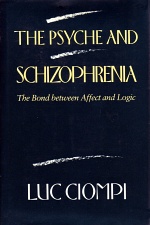 Luc Ciompi
Luc Ciompi
THE PSYCHE AND SCHIZOPHRENIA.
The Bond between Affect and Logic
ISBN-10: 0674719905
ISBN-13: 978-0674719903
Harvard University Press, Cambridge/Mass. (USA) and London (GB), 1988
Order at Amazon ...
Book contributions and scientific articles in English
- Ciompi L., Tschacher W.: Affect-logic, embodiment, synergetics, and the free energy principle: New approaches to the understanding and treatment of schizophrenia. Entropy 2021, 23(12), 1619; https://doi.org/10.3390/e23121619 / Full Text (PDF, 607 kB)

- Ciompi, L. The key role of emotions in the schizophrenia puzzle. Schizophrenia Bulletin 41: 318-322, 2015 Full Text (PDF, 178 kB)

- Ciompi, L., Baatz, M.:, The energetic dimension of emotions - an evolution-based computer simulation with far-reaching implications. Theoretical Biology 3: 42-50, 2008. Full Text (PDF)
 / Abstract
/ Abstract - Ciompi, L., Panksepp, J.: Energetic effects of emotions on cognitions - complementary psychobiological and psychosocial findings. Consciousness and Emotion, 23-55, 2005
- Ciompi, L., Baatz, M.: Do mental processes have a fractal structure? The hypothesis of affect- logic. In: Losa AL, Merline D, Nonnenmacher TF, Weibel ER. (eds) Fractals in Biology and Medicine, Vol IV, Birkhäuser, Basel 2005, S.107-119.
- Ciompi, L. Hoffmann, H.: Soteria Berne. An innovative milieutherapeutic approach to acute schizophrenia based on the concept of affect-logic. World Psychiatry 3:140-146, 2004
- Ciompi, L.: Reflections on the role of emotions in consciousness and subjectivity, from the perspective of affect logic. Consciousness and Emotion 4:181-196, 2003. Full Text (PDF, 149 kB)

- Ciompi, L.: Un modèle énergétique non linéaire de la psyché et ses applications = A nonlinear and energetic affectivo-vognitive model and its practical implications for psychiatry. In Confrontations psychiatriques, no. spécial "1968-1998 : 30 ans de confrontations". pp. 33-63, 2000. Abstract (PDF, 134 kB)

- Ciompi L.: An affect-centered model of the psyche and its consequences for a new understanding of nonlinear psychodynamics. In Tschacher, W., Dauwalder, J.P. (eds): Dynamics, synergetics, autonomous agents. Nonlinear system approach to cognitive psychology and cognitive science. World Scientific, Singapure-New Jersey-London-Hong Kong, 1999, pp.123-131
- Ciompi, L.: Is schizophrenia an affective disease? The hypothesis of affect-logic and its implications for psychopathology. In: Flack W.F., Laird J.D.(eds.) Emotions in psychopathology: Theory and research. Oxford University Press, New York Oxford pp. 283-297, 1998
- Ciompi, L.: The concept of affect logic. An integrative psycho-socio-biological approach to understanding and treatment of schizophrenia. Psychiatry 60: 158-170, 1997
- Wimmer, M., Ciompi L.: Evolutionary aspects of affective-cognitive interactions in the light of Ciompi's concept of "affect-logic", Evolution and Cognition 2:37-58, 1996
- Ciompi, L.: Affect logic: an integrative model of the psyche and its relations to schizophrenia. Brit. J. Psychiatry 164:51-55, 1994
- Ciompi, L.: Affects as central organising and integrating factors. A new psychosocial/biological model of the psyche. Brit. J. Psychiat. 159: 97-105, 1991
Books, book contributions and scientific articles in German
see German version of the Website
Books in Italian
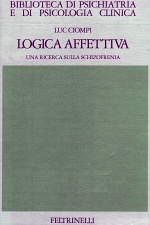 Ciompi, L.: Logica affettiva. Una ricerca sulla schizofrenia. Feltrinelli, Milano, 1994
Ciompi, L.: Logica affettiva. Una ricerca sulla schizofrenia. Feltrinelli, Milano, 1994
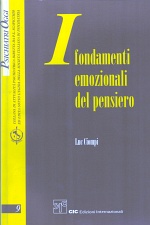 Ciompi, L.: I fondamenti emozionali del pensiero. CIC Edizioni internazionali, Roma, 2001
Ciompi, L.: I fondamenti emozionali del pensiero. CIC Edizioni internazionali, Roma, 2001
Books in Spanish
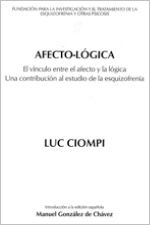 Ciompi, L.: Affecto-lógica. El vinculo entre afecto y la lógica. Una contribución al estudio de la esquizofrenia. Fundación para la investigación z el tratamiento de la esquiyofrenia z otros psicosis. Madrid 2010. ISBN 978-84-614-4737-4
Ciompi, L.: Affecto-lógica. El vinculo entre afecto y la lógica. Una contribución al estudio de la esquizofrenia. Fundación para la investigación z el tratamiento de la esquiyofrenia z otros psicosis. Madrid 2010. ISBN 978-84-614-4737-4
Books in Japanese
© Luc Ciompi - www.ciompi.com - Last modified: 01.02.2023
